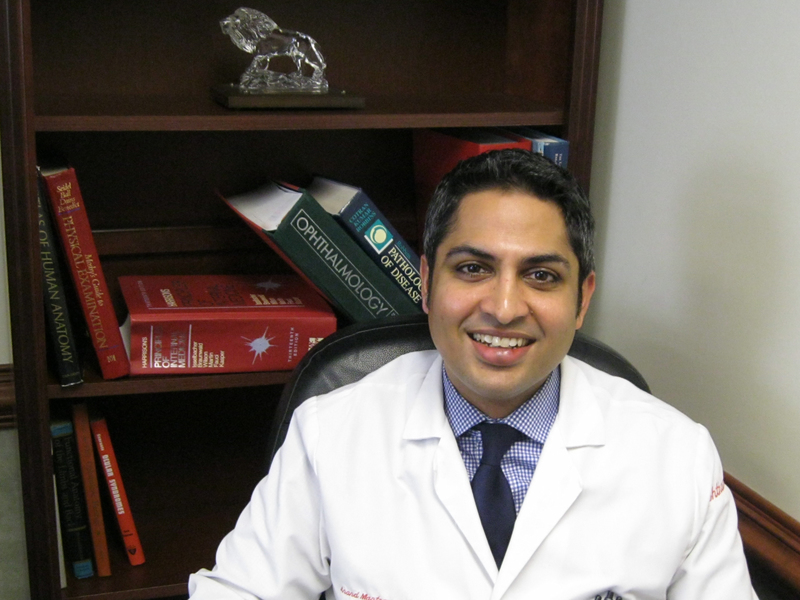Glaucoma is the leading cause of irreversible blindness, yet it attacks silently, with no symptoms. The month of January has been designated National Glaucoma Awareness Month in an effort to educate people about the effects of this silent, blinding disease.
More than 2.2 million Americans over the age of 40 have glaucoma. The chronic disease affects African Americans and older Hispanics at a higher rate than other races.
According to Prevent Blindness America, glaucoma damages the optic nerve, which send information from the eyes to the brain. When this nerve is damaged, peripheral vision diminishes. Once sight is lost, it cannot be returned.
Dr. Anand Mantravadi of the Wills Eye Institute in Philadelphia works solely with the Delaware Eye Institute on Route 24 outside Rehoboth. It is the only place he practices, sees patients and performs surgery in Sussex County, allowing Cape Region residents an opportunity to have surgery locally.
Mantravadi said risk factors for glaucoma include advancing age; family history; previous eyesight issues, including nearsightedness, eye injury or surgery; and the use of steroids.
"The incidence of glaucoma is increasing nationwide because of the aging population," Mantravadi said. "Even as it increases, I still only recommend surgery when people have exhausted other options like medicine and laser treatments."
Specializing in surgical and medical treatment of glaucoma, Mantravadi said the biggest issue is understanding the disease. Glaucoma affects the pressure in the eye, but having a higher pressure reading does not always mean it's glaucoma. Several tests are performed before glaucoma is diagnosed, he said.
"It is not a one-test deal, but maybe in the future it will be," Mantravadi said.
Researching the disease
Scientists and researchers are working on advances in glaucoma diagnosis and treatment, Mantravadi said.
Glaucoma is usually controlled with eye drops taken several times a day, sometimes in combination with pills. The eye drops decrease pressure in the eye by helping fluid drain or decreasing the amount of fluid in the eye.
For these medications to work, patients must take them regularly and continuously, Mantravadi said. Many times patients miss doses, which can reduce the effectiveness of the eye drop. Mantravadi said a big advance in care would be time-release medicine.
One big break could come when researchers develop a time-release insert that could be placed in the eye and slowly release medicine. One of the biggest hurdles with treatment is getting the patient to regularly use eye drops.
"So far time-released inserts are not being used clinically - just in experimentation," Mantravadi said.
Other trials are working to produce better eye drops to stop the advance of glaucoma. The disease often starts gradually by reducing peripheral vision, but many patients do not notice it at first. The loss of vision advances inward toward central vision. Once the vision is lost, it cannot be regained, which is why Mantravadi said he encourages everyone to have regular eye exams, especially those over the age of 60.
If eye drops are not the answer, then Mantravadi performs a laser treatment. The last resort is eye surgery on the optic nerve.
"The field of glaucoma surgery has seen a lot of improvements and more are coming. There are new pathways and breakthroughs on the horizon, and the patient has more options now than in the past," Mantravadi said.
One of the improvements is a new high-tech scan of the eye, which, when paired with field vision tests, can better diagnose glaucoma at an early stage. Catching glaucoma early is the key to saving vision, Mantravadi said.
"Glaucoma is pretty common, and our opthamologists see glaucoma patients as well for treatment, but if it is advanced, they see Dr. Mantravadi," said Bob Uffelman, executive director of the Delaware Eye Institute.
The Delaware Eye Institute has locations on Route 24 outside Rehoboth and in Millsboro. The center sees 40,000 patient visits annually.
Area medical facilities occasionally offer free glaucoma screenings, but currently none are scheduled.
For more information on glaucoma or Prevent Blindness America, call 1-800-331-2020 or visit www.preventblindness.org.
For more information about Delaware Eye Institute, call 302-645-2300 or go to www.delawareeye.com.
What causes glaucoma?
Clear liquid, called the aqueous humor, flows in and out of the eye. This liquid is not part of the tears on the outer surface of the eye. You can think of the flow of aqueous fluid as a sink with the faucet turned on all the time.
If the "drainpipe" gets clogged, water collects in the sink and pressure builds up. If the drainage area of the eye- called the drainage angle - is blocked, the fluid pressure within the inner eye may increase, which can damage the optic nerve.

















































